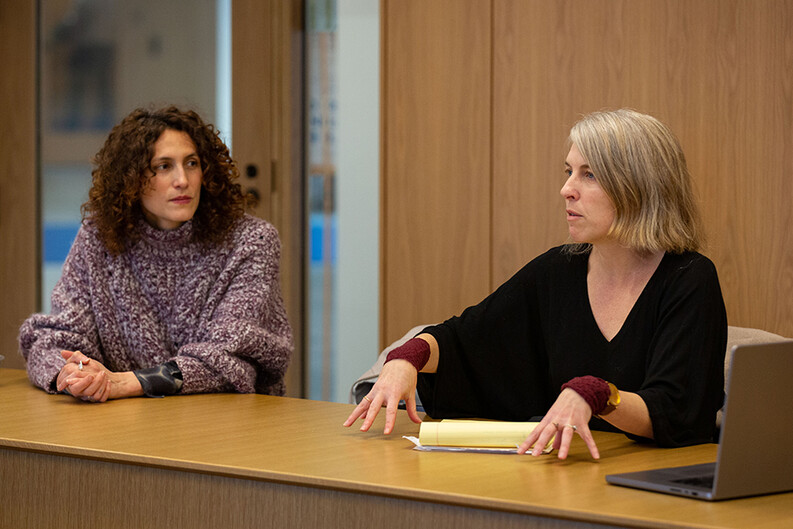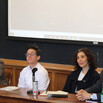The Ups and Downs of Advocacy

In Yale Law School’s clinics, learning to navigate around setbacks is part of the journey.
Students in Yale Law School’s Strategic Advocacy Clinic were busy preparing for trial last fall in their lawsuit challenging Wisconsin’s parole procedures for people sentenced to life in prison as juveniles when they got an email that stopped them in their tracks.
They had lost the case.
In November, a federal judge granted the state’s motion for summary judgment against them. Because the judge had previously denied a motion to dismiss, the decision came as a shock. The students, their faculty supervisors, and their partners at Foley & Lardner, Quarles & Brady, and the ACLU of Wisconsin had been in the process of interviewing potential new named plaintiffs to replace the dozens of individuals they had already helped win release from prison.
“We were all getting ready for trial. Everyone was flying to Wisconsin,” said Clinical Lecturer in Law Avery P. Gilbert, who directs the clinic. “To get that decision after so much work — it was utterly gutting for us.”
But for attorneys and advocates who work on public interest and social justice issues, setbacks and losses are par for the course. Law schools and law firms celebrate when their efforts lead to successful verdicts, far-reaching settlements, or new and improved legislation. But, on the journey to systemic change, losing is often part of the process.
“We lose more than we win, and it is really difficult,” said Professor of Law Issa Kohler-Hausmann ’08, faculty sponsor for the Strategic Advocacy Clinic, or SAC. “It raises strategy questions about how best to fight for the people you are trying to represent and also how to keep going in the face of constant disappointment.”
At Yale Law School, where clinical students, faculty, and staff work on a range of seemingly intractable problems ranging from global health, the environment, and access to housing, learning to overcome or navigate around setbacks is part of the lesson plan. Students are trained to pursue their clients’ goals on multiple fronts — to draft and lobby for legislation that would negate the need for litigation, to sue and simultaneously seek a settlement, and to ensure their clients’ voices are heard in the court of public opinion. When one path narrows or disappears, they continue along another.
The key to it all is to have a long lens, said William O. Douglas Clinical Professor of Law Michael J. Wishnie ’93, who also serves as Deputy Dean for Experiential Education, director of the Veterans Legal Services Clinic (VLSC), and a co-teacher of the Worker and Immigrant Rights Advocacy Clinic.
“As much as possible, we ground our legal work in social movements. The collective struggle of many other people began long before us and will continue long into the future, whether we happen to win or lose a particular case,” he said. “I think more about progress and setbacks across a continuum of efforts towards social change.”
“A Balancing Act”
In 2013, VLSC filed a lawsuit on behalf of a woman who was raped as a cadet at West Point. The client and the clinic knew that the case faced steep doctrinal hurdles — it challenged the so-called Feres doctrine, which stems from a 1950 U.S. Supreme Court ruling that the military cannot be held liable for injuries to military personnel when the injuries “arise out of or are in the course of activity incident to service.” But the case was part of a larger campaign — including Freedom of Information Act (FOIA) litigation, legislative advocacy, and media advocacy — by the Service Women’s Action Network (SWAN), a clinic client, to change the culture around sexual assault and harassment in the military service academies.
The case, filed on behalf of a woman known as Jane Doe, survived a motion to dismiss before a federal trial court judge, but that decision was later reversed on appeal in a 2–1 ruling. In 2021, the U.S. Supreme Court denied cert, cementing the adverse decision.
“We lose more than we win, and it is really difficult. It raises strategy questions about how best to fight for the people you are trying to represent and also how to keep going in the face of constant disappointment.”
—Professor Issa Kohler-Hausmann ’08
“It was a loss, to be sure,” Wishnie said. “But our client understood from the beginning that the litigation was a long shot, flying in the teeth of decades of adverse precedent. She and SWAN decided to pursue it anyhow and were proud of the fight.”
Other setbacks are more surprising. In the Peter Gruber Challenging Mass Incarceration Clinic (CMIC), for instance, students spent several years working on a client’s effort to have his life without release sentence commutated by the Connecticut Board of Pardons and Paroles.
“It was probably the most comprehensive application that anyone could put together,” said Clinical Professor of Law Miriam Gohara, director of the Jerome N. Frank Legal Services Organization, which houses some of Yale Law School’s clinical programs. “Our client is extraordinary. He is extremely rehabilitated. Advocates within the correctional system want him to get out.”
Then, in August, the board quietly changed their application process, making people serving life without release sentences suddenly ineligible to even apply for commutation.
“That was a setback I had not anticipated,” Gohara explained. “It was a real lesson that even experienced lawyers don’t have all the answers.”
Elsa Lora ’23, who has worked in the CMIC since she was a 1L, agreed.
“We had anticipated many potential roadblocks when we devised our case strategy, but this was not one of them,” she said. “This news was really discouraging — to the team, but especially to our client.”
Strategic Advocacy Clinic student Connor J. Bell ’24 said public interest issues and cases require a certain level of compartmentalizing.
“A setback is always possible,” he said. “But you also can’t do the work without holding onto some hope. It’s a balancing act between coaching yourself that you have the law right and the facts right and it’s the right thing to do but also knowing the empire could strike back.”
Community Support
As part of their experience in clinics, Yale Law School students are counseled on how to deal with vicarious trauma, the emotional burdens that come with representing people who have suffered horrific injustices and working on difficult cases. With 90% of the student body participating in at least one clinic, that’s a lesson imparted to the majority of the community.
Hillary N. Vedvig ’17, an attorney at Foley & Lardner in Wisconsin who helped bring together the coalition of partners on the SAC’s parole case, worked for two years on a report documenting the criminalization of homelessness in Connecticut as a student in the Lowenstein International Human Rights Clinic.
“We talked a lot about talking through your feelings,” she remembered. “That prepared me really well for this case.”
Nevertheless, after receiving the summary judgment order in Wisconsin, she took the rest of the day off to decompress.
“I cried a lot,” she said.
She also called two of her former classmates in the Lowenstein clinic to commiserate.
“We rely on each other,” she said. “That sense of community helps.”
Building that community is a large part of the work of clinics at Yale, instructors said. In addition to counseling clients and their family members, “we try to support each other and ourselves,” Gohara added. “We talk about coping strategies. Even when you’re supposedly winning, you have to go through a lot of really difficult stuff to put these cases together.”
Building resilience in public interest work also means acknowledging and celebrating victories — whether large or small.
In the CMIC case, wins included securing letters from victims’ advocates and top correctional officials on their client’s behalf. In the VLSC case challenging the Feres doctrine, Wishnie points out that two of four federal judges to consider the matter — a district judge and a dissenting appellate judge — agreed with Doe’s position.
“That’s two more than had ever said anything like that before” at the time, he said. “We were batting .500 when everyone else had whiffed for 70 years.”
Even depositions present an opportunity to raise awareness about a problem and potential solutions, Gilbert said.
“There were parole commissioners on the verge of tears during their depositions” in a similar ongoing case in New York, she remembered. “Some of them were realizing for the first time that these crimes came out of poverty and lack of access and that there are harms on both sides. They had never really thought about what that means.”
Gohara agreed.
“All advocacy pulls in more people who are going to be aware of the problems,” she said. “That’s changing the environment in which these cases are going to be heard and considered.”
Staying in the Fight
Carl Lasker ’24 said that the Wisconsin case and his experience in the Strategic Advocacy Clinic have only affirmed his desire to pursue public interest work.
“We had this devastating loss, but we’re still going,” he said. “I’m more motivated than before. I don’t want to advocate any less fiercely.”
“We had this devastating loss, but we’re still going. I’m more motivated than before. I don’t want to advocate any less fiercely.”
—Carl Lasker ’24
Advocacy in the SAC goes beyond litigation. Students in the clinic have created a fund to help people pay court fines and fees and are working to change laws and practices around felony disenfranchisement, among other efforts.
“[SAC] does work in a variety of arenas,” Lasker said. “Sometimes a mix of strategies is most useful to achieve results.”
In fact, creating systemic change requires a multifaceted approach that is guided by the communities experiencing the injustice, clinic instructors say.
“Social change generally comes from below, not above, so building the capacity of organizations and individuals to make their desire for social change heard by decision-makers is critical,” Gilbert said.
Lora said CMIC students have been reaching out to experts “across various fields” to find new ways to help their client, who is no longer eligible for commutation.
“I came to think of our work as solving a puzzle with lots of small, indistinct pieces,” she said. “Initially, we used legal research to try to put the pieces together. It gradually became clear that the best solution might not be a legal one.”
Likewise, the VLSC’s advocacy on the issue of sexual assault in the military service academies, including on behalf of the Service Women’s Action Network, extended far beyond the Doe case. Over the years, students have sought to reform the military’s regulations related to sexual violence and used FOIA litigation to expose gender disparities in the military justice system and in nominations to the military service academies. Students also used FOIA disclosures to draft and advocate legislation, enacted by Congress, to address gender bias in service academy admissions.
“Change is rarely linear,” Wishnie said. “If you lose, you appeal. If you can’t appeal, then you come in from a different direction. There’s always something more to be done, somewhere else to put your effort.”
In Wisconsin, students continue to to advocate for parole for life sentenced juveniles. And they haven’t given up on their push for more systemic relief in the state.
Rachel Crowl ’24 is looking into whether the clinic could offer trainings for parole board members about how to appropriately consider whether a person should be released based on demonstrated maturity and rehabilitation.
“If we’re going to lose in litigation, maybe we can ask them to work with us on best practices,” she explained.
Meanwhile, the SAC’s case in New York continues. As in Wisconsin, many clients have already been released through the course of litigation. One, Lawrence Bartley, now a journalist for the Marshall Project, told his story in a documentary short called Second Shot that features Kohler-Hausmann.
The students and their partners, including attorneys at Cravath, Swaine & Moore, have also already won several accommodations for their clients in the state.
Whatever the final result in that case, Bell said lawyers have a responsibility to do the work even when a loss is more likely than a win, if doing so is in a client’s best interest.
“It’s still important just to fight the fight and stand by the arguments that you know to be right,” he said. “Human dignity demands that.”


